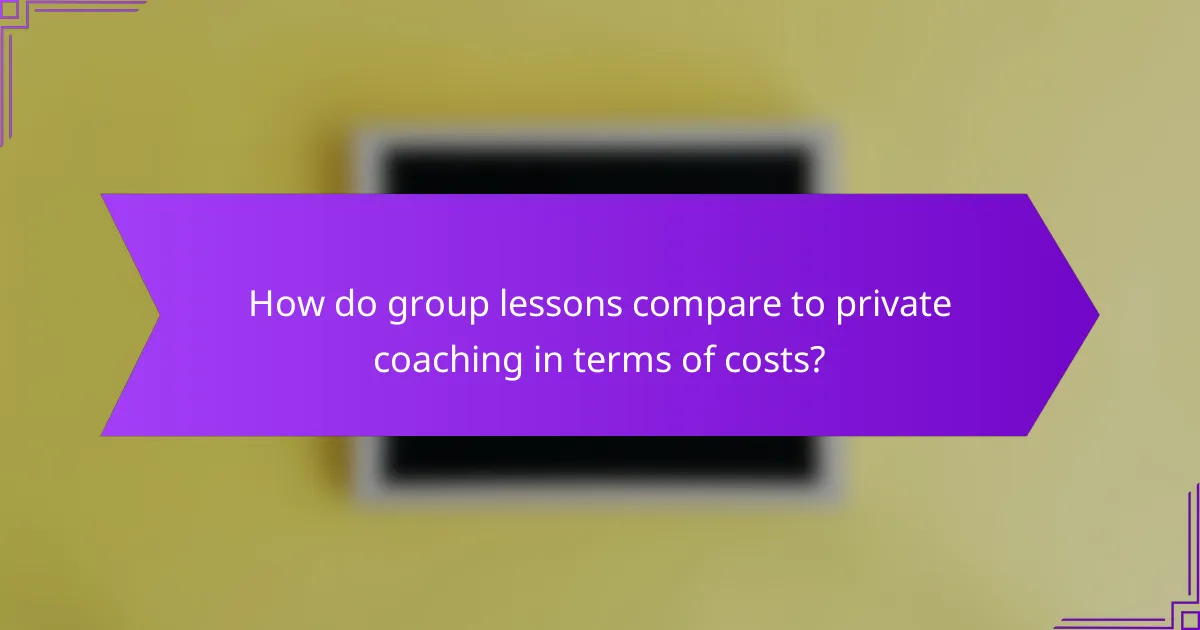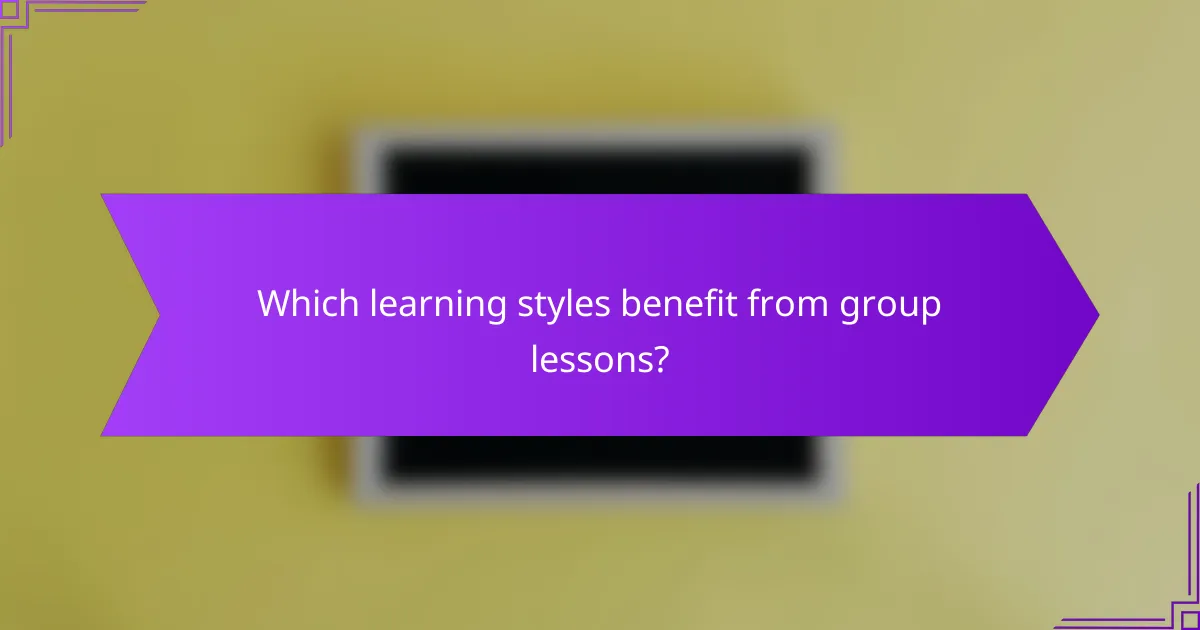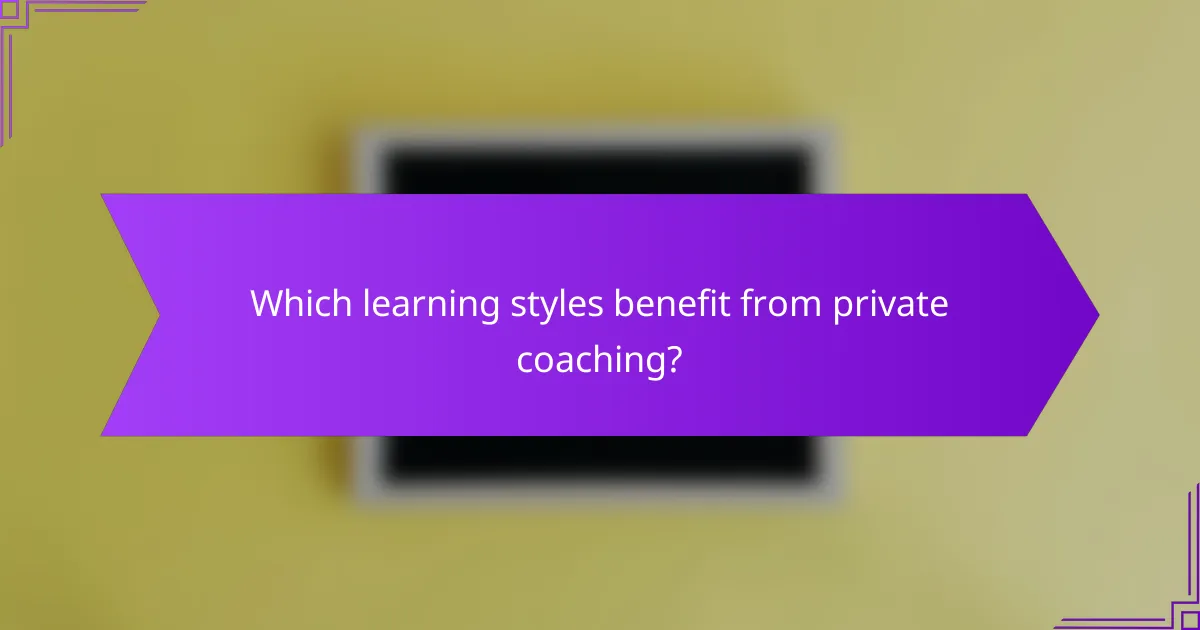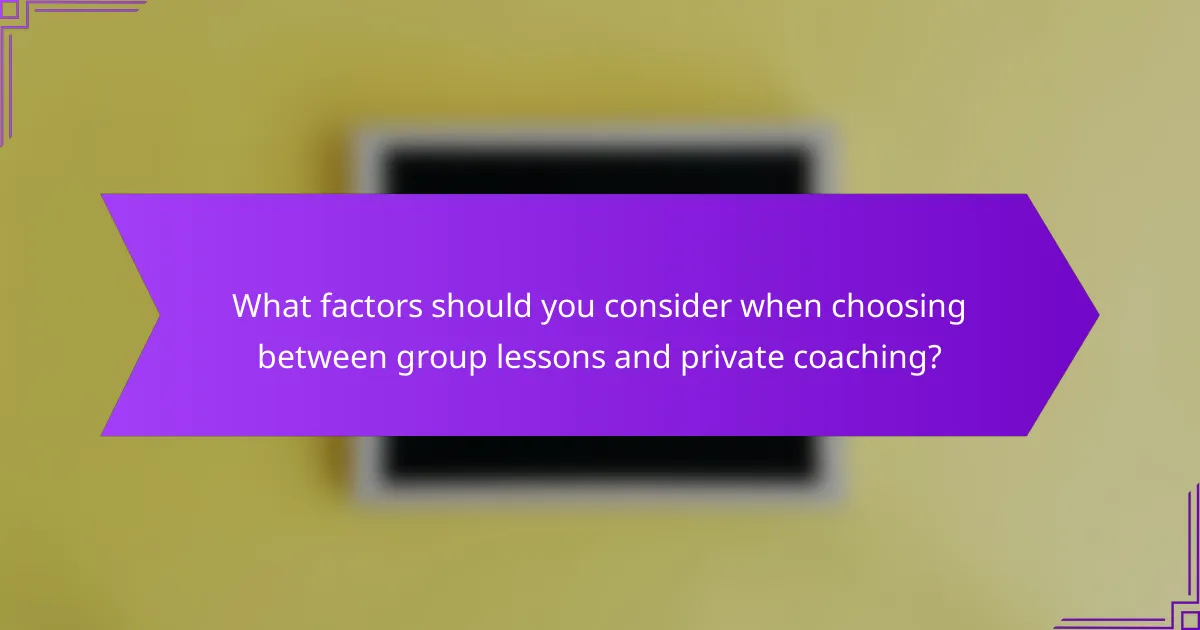When deciding between group lessons and private coaching, it’s essential to consider the benefits, costs, and learning styles that best suit your needs. Group lessons provide a collaborative environment and are often more budget-friendly, while private coaching offers personalized instruction tailored to individual goals. Understanding these differences can help you make an informed choice that aligns with your learning preferences and financial considerations.

What are the benefits of group lessons in Los Angeles?
Group lessons in Los Angeles offer a collaborative learning environment where participants can benefit from shared experiences and collective knowledge. These lessons are often more affordable than private coaching, making them accessible to a wider audience.
Cost-effective learning
Group lessons typically cost less than private coaching, making them a budget-friendly option for many learners. In Los Angeles, you might find group classes ranging from $20 to $50 per session, while private lessons can start at $75 and go much higher.
By sharing the instructor’s time with others, students can enjoy quality instruction without the high price tag. This cost-effectiveness allows learners to participate more frequently, enhancing their overall experience and skill development.
Social interaction and networking
Participating in group lessons fosters social interaction, allowing students to build connections with peers who share similar interests. This networking can lead to friendships, collaborations, and even professional opportunities within the vibrant Los Angeles community.
Engaging with others in a group setting can also boost motivation and accountability, as learners encourage one another to progress. The shared experience can create a supportive atmosphere that enhances the learning journey.
Diverse perspectives and feedback
Group lessons provide access to a variety of perspectives, which can enrich the learning experience. Students can hear different viewpoints and approaches to the same topic, broadening their understanding and sparking new ideas.
Additionally, receiving feedback from multiple peers can help learners identify strengths and areas for improvement. This collaborative feedback loop often leads to deeper insights and a more comprehensive grasp of the subject matter.

What are the benefits of private coaching in Los Angeles?
Private coaching in Los Angeles offers tailored instruction that meets individual needs, allowing for a more effective learning experience. This personalized approach can lead to faster skill acquisition and greater overall satisfaction compared to group lessons.
Personalized learning experience
Private coaching provides a customized learning experience that focuses on the unique strengths and weaknesses of each student. In Los Angeles, coaches can adapt their teaching methods and materials to suit individual learning styles, ensuring that students grasp concepts more thoroughly.
For example, a coach may use specific exercises that resonate with a student’s interests, making practice more engaging. This level of personalization often leads to quicker progress and a deeper understanding of the subject matter.
Flexible scheduling
One of the significant advantages of private coaching is the flexibility in scheduling sessions. Students can arrange lessons at times that fit their busy lives, whether early in the morning or late in the evening, accommodating work or school commitments.
This flexibility allows for consistent practice without the constraints of a fixed group schedule, making it easier to maintain momentum in learning. In a city like Los Angeles, where traffic can be unpredictable, this adaptability can save time and reduce stress.
Focused skill development
Private coaching allows for concentrated skill development, as the coach can target specific areas for improvement. This focused approach is particularly beneficial for students preparing for competitions or exams, where mastering particular skills is crucial.
In Los Angeles, where many students pursue specialized training, having a coach who can hone in on these skills can make a significant difference. Students can expect to see measurable progress in their abilities, as the coaching sessions are designed to address their particular goals and challenges.

How do group lessons compare to private coaching in terms of costs?
Group lessons are generally more affordable than private coaching, making them accessible to a wider audience. However, the choice between the two depends on individual learning preferences and goals, as well as budget considerations.
Average costs of group lessons
Group lessons typically range from $15 to $50 per session, depending on the subject and location. For example, fitness classes or language courses often fall within this price range. Some institutions may offer package deals that reduce the per-class cost.
In many cases, group lessons are priced lower because the instructor divides their time among multiple students. This shared attention can be beneficial for social learning and peer interaction.
Average costs of private coaching
Private coaching sessions usually cost between $50 and $150 per hour, with prices varying based on the coach’s experience and expertise. For instance, specialized skills like music or sports coaching may command higher rates.
While private coaching is more expensive, it offers personalized attention and tailored lesson plans, which can accelerate learning for individuals with specific goals or challenges.
Cost-benefit analysis
When evaluating costs, consider your learning style and objectives. Group lessons can be cost-effective for those who thrive in collaborative environments, while private coaching may be worth the investment for students needing focused guidance.
Weigh the benefits of personalized feedback against the social advantages of group settings. If budget constraints are significant, group lessons may provide a satisfactory compromise without sacrificing too much on quality.

Which learning styles benefit from group lessons?
Group lessons are particularly beneficial for learners who thrive in collaborative environments and enjoy social interactions. These lessons foster teamwork, communication, and shared experiences, making them ideal for various learning styles.
Collaborative learning style
Individuals with a collaborative learning style excel when they can engage with others. Group lessons provide opportunities for discussion, peer feedback, and joint problem-solving, which enhance understanding and retention of material. This style encourages learners to share insights and learn from one another, making the learning process more dynamic.
To maximize benefits, participants should actively contribute to discussions and be open to different perspectives. Group activities, such as projects or debates, can further enhance collaborative learning by allowing learners to apply concepts in real-time.
Visual and auditory learners
Visual and auditory learners often benefit from group lessons due to the variety of teaching methods employed. In these settings, instructors typically use visual aids, such as slides or videos, alongside verbal explanations, catering to both learning preferences. This multi-sensory approach helps reinforce concepts and makes learning more engaging.
To support these learners, instructors should incorporate diverse materials and encourage group discussions that allow auditory learners to process information through conversation. Additionally, visual learners can benefit from collaborative projects that involve creating visual presentations or diagrams.
Social learners
Social learners thrive in environments where they can interact with peers. Group lessons provide the social engagement that these learners crave, allowing them to build relationships while acquiring new skills. The social aspect of learning can enhance motivation and make the experience more enjoyable.
To cater to social learners, group lessons should include activities that promote interaction, such as role-playing or team challenges. Instructors should encourage a supportive atmosphere where learners feel comfortable sharing their thoughts and asking questions, fostering a sense of community and belonging.

Which learning styles benefit from private coaching?
Private coaching is particularly advantageous for learners who thrive on personalized attention and tailored instruction. This approach allows for customized lesson plans that align with individual learning preferences, enhancing engagement and retention.
Kinesthetic learners
Kinesthetic learners, who grasp concepts best through hands-on experiences, benefit significantly from private coaching. In a one-on-one setting, instructors can design activities that involve movement and physical interaction, such as role-playing or practical demonstrations. This personalized approach helps these learners to actively engage with the material, making it easier to understand and remember.
For example, a kinesthetic learner studying a sport can practice techniques directly with a coach, receiving immediate feedback and adjustments tailored to their unique style. This level of interaction is often not possible in group lessons, where the focus is typically on the majority’s needs.
Independent learners
Independent learners thrive when given the freedom to explore topics at their own pace, making private coaching an ideal fit. These individuals often prefer to take charge of their learning journey, seeking guidance only when necessary. A private coach can provide the right balance of support and autonomy, allowing independent learners to pursue their interests while still receiving expert advice.
For instance, an independent learner studying a language might choose to focus on specific vocabulary or grammar rules that interest them, with a coach available to clarify doubts or provide resources. This flexibility can lead to deeper understanding and retention of the material.
Goal-oriented learners
Goal-oriented learners benefit from private coaching as it allows for a focused approach to achieving specific objectives. These learners often have clear targets, such as passing an exam or mastering a skill, and private coaching can provide a structured plan to reach those goals efficiently. Coaches can tailor sessions to concentrate on areas that require improvement, ensuring that progress is measurable and aligned with the learner’s aspirations.
For example, a goal-oriented learner preparing for a certification might work with a coach to develop a study schedule, focusing on practice tests and targeted skill development. This personalized strategy can significantly enhance motivation and accountability, leading to successful outcomes.

What factors should you consider when choosing between group lessons and private coaching?
When deciding between group lessons and private coaching, consider your personal learning style, objectives, and budget. Each option offers distinct advantages that can impact your overall experience and progress.
Learning objectives
Your learning objectives play a crucial role in determining whether group lessons or private coaching is more suitable for you. If you have specific goals, such as mastering a particular skill or preparing for an exam, private coaching may provide the tailored approach you need. In contrast, group lessons can be beneficial for broader learning objectives, such as improving general skills or gaining exposure to different perspectives.
Consider the pace at which you want to learn. Private coaching allows for a customized pace, enabling you to spend more time on challenging areas. Group lessons, however, often follow a set curriculum that may move faster than your personal comfort level, which could hinder your understanding.
Costs
Cost is a significant factor when choosing between group lessons and private coaching. Generally, group lessons are more affordable, often costing a fraction of the price of private sessions. For instance, group lessons might range from $15 to $50 per session, while private coaching can vary widely from $50 to over $150 per hour, depending on the instructor’s expertise and location.
Evaluate your budget and the frequency of lessons you can commit to. If you can only afford a few sessions, private coaching might provide a more intensive experience. However, if you are looking for ongoing support, group lessons could offer a more sustainable option.
Learning styles
Your preferred learning style can significantly influence your choice between group lessons and private coaching. If you thrive in collaborative environments and enjoy learning from peers, group lessons may enhance your experience. They provide opportunities for discussion, teamwork, and shared insights that can deepen understanding.
On the other hand, if you prefer individualized attention and a focus on your unique challenges, private coaching is likely the better fit. This one-on-one format allows for immediate feedback and personalized strategies that cater to your specific needs, which can be particularly beneficial for complex subjects.



